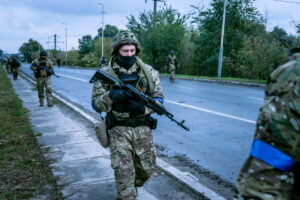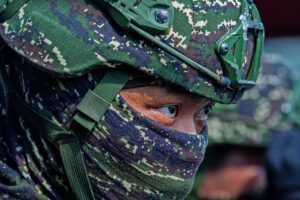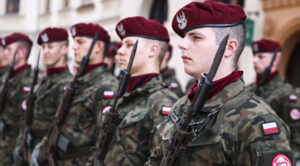“Ukraine has been defending itself heroically for more than 400 days, and we Poles have kept our word. You can always count on Poland!” Thus did Polish president Andrzej Duda salute Volodymyr Zelenskyy in April, heralding him as a friend and a hero and pledging Poland’s continued support for his beleaguered nation.
Since the Russian invasion began, Poland has been one of Ukraine’s most assertive military, financial and diplomatic supporters. The Polish people have also welcomed fleeing Ukrainians into their homes with open arms. So you’d be forgiven for thinking that the two countries had always been the closest of allies.
But Ukraine couldn’t always count on Poland. For much of their history, the two nations have harboured deep resentment against each other. And Ukraine has, at times, seen Poland as just as much of an antagonist as Russia. Centuries of mistrust between the two, starting with a Ukrainian Cossack rebellion against Polish authority back in the 17th century, culminated in Poland’s forced deportation of 150,000 Ukrainians and related ethnic minorities from Poland’s southeastern borderlands in 1947 — an act that the post-Cold War Polish government has formally condemned.
And for their part, the Poles are yet to forgive the Ukrainians for the grisly Volhynia massacres of 1943-1945, when the Ukrainian Insurgent Army (UPA), a far-Right paramilitary, killed as many as 100,000 Poles — many of them women and children — in Volhynia and Eastern Galicia. These places today lie in western Ukraine, but were part of Poland before the Second World War. The killing spree was bound up with a Ukrainian nationalist campaign to establish an independent Ukrainian state and prevent post-war Poland taking back its former territory.
The two nations still don’t see eye-to-eye on the issue: while the Ukrainians tend to refer to the massacres as a “tragedy”, the Polish talk about the Volhynia “genocide” or “slaughter”. One reason Ukrainians are reluctant to look too closely at the matter is that the UPA, the organisation responsible for the massacres, was founded by followers of Stepan Bandera — one of the revered, if controversial, fathers of Ukrainian nationalism. He is lionised by many Ukrainians today — though certainly not all — because of his stalwart, uncompromising fight against the Soviet Union. Since Russia’s invasion last year, Ukrainian public figures have been especially nervous of sullying his legacy, as the country is in need of historical symbols to rally around. According to one poll, Bandera is now viewed favourably by 74% of Ukrainians.
But Poland wants to present a united front with Ukraine against Russia. Wary of vindicating Putin’s dehumanising depiction of Ukraine as a nation of murderous fascists, it has called for “reconciliation and forgiveness” over the Volhynia killings. Zelenskyy, too, has shown goodwill. And so, earlier this month, he joined Duda in honouring Polish victims on the 80th anniversary of the massacre’s start. He has also promised to exhume the bodies of Polish victims from mass graves on Ukrainian territory so that they can be given proper burials — a courtesy long demanded by Poland.
It is in Ukraine’s interests to settle the issue. By coming to terms with the UPA atrocities in Volhynia, Ukraine would be able to craft a more nuanced view of its history and national identity, which would better suit its current pluralistic, democratic character than the narrow, authoritarian and racialised vision of Bandera. This in turn will make it harder for Russia to distort Ukrainian history and demonise its national heritage, depriving Putin of a key weapon in his fight against Ukraine.
Yet coming to terms with the massacre won’t be easy. Ukraine’s government has never denied the killings took place; the trouble is in the detail and framing. Some Ukrainian officials have used reprisals by Polish self-defence units at the time to suggest that the massacres were the result of a tit-for-tat territorial dispute — even though far fewer Ukrainians, between 10,000 and 20,000 civilians and UPA militants, were killed by Poles in these attacks. A common phrase used by Ukrainian public figures is “We forgive and ask for forgiveness”, which sounds nice, but creates a sense of equal and mutual wrongdoing.
Even more concerning are the Ukrainian scholars who cast doubt on how closely involved the UPA leadership was in orchestrating the killings. And here is the heart of the problem: for many Ukrainians, the UPA and its parent organisation, the Organisation of Ukrainian Nationalists (OUN), played a crucial role in Ukraine’s struggle for independence — and so cannot simply be erased from the national narrative. Because Ukrainians have historically viewed themselves exclusively as victims of foreign domination, implicating the UPA and OUN in an arguably genocidal campaign would challenge central elements of their self-image, and would complicate their perception of figures such Bandera as righteous rebels against oppression.
The Volhynia massacres took place at a desperate juncture in Ukrainian’s journey towards freedom. At the end of the First World War, Ukrainians twice attempted to establish independent states on the territory of modern Ukraine. However, by 1921, both efforts had failed, and Ukrainians were once again a subjugated people, split between the USSR and Poland. While Ukrainian identity was encouraged for a time in Soviet-annexed Ukraine, by the Thirties, Stalin’s collectivisation policies had led to the devastating, man-made Holodomor famine that killed millions of Ukrainians. In the inter-war Second Polish Republic, Ukrainian desires for autonomy were tolerated to varying degrees depending on who was in charge, but by and large Ukrainians were treated as second-class citizens.
In response to both the famine in the communist USSR and the oppressive Polish state, certain Ukrainian nationalists adopted an increasingly militant far-Right ideology. When Nazi Germany invaded Poland and later the USSR, these Ukrainian nationalists, including Bandera, joined forces with the Germans, believing that they had finally found their ticket to independence. However, when Bandera and the OUN declared an independent Ukrainian state in 1941 under German auspices, he and other OUN leaders were arrested by occupying Nazi authorities and their hopes were dashed yet again. The UPA and local OUN commanders loyal to Bandera turned against the Germans, but remained convinced that the only way to bring about the ethnically-pure Ukrainian state they envisioned would be to act against the local Polish population while the German occupiers were still in charge — leading them to instigate the Volhynia massacres in 1943.
This has given Russia plenty of fodder for propaganda. The Kremlin has tried to paint Bandera as a hardened Nazi for years in order to brand modern Ukraine as a fascist state — in 2021, Putin baselessly claimed Bandera’s “followers” in Ukraine were making plans to massacre Russian speakers in eastern Ukraine, and called Ukrainians “neo-Nazis and Banderites” shortly after touching off his invasion last year. Yet Moscow has conveniently ignored the fact that the modern Ukrainian state that emerged in 1991 was entirely unaffiliated with the visions of Bandera, the OUN and the UPA, and that Bandera was simply one of many Ukrainian independence fighters who didn’t all share the same ideology.
Resolving a decades-old historical dispute with a country it now considers one of its closest allies feels like an issue of only passing importance while Ukraine is under attack. But it is precisely because of the Russian invasion that it should be confronted. The war has catalysed a dramatic renaissance of Ukrainian culture and identity as Ukrainians demonstrated that theirs is an independent nation worth dying for, creating the perfect opportunity for them to build a more holistic and critical perspective on the early 20th-century nationalism that helped to forge their country.
There are indications Ukraine is keen to take up the challenge. This May, the head of Ukraine’s parliament said during a speech to Poland’s parliament that Ukraine “will work with you, dear Polish friends, accepting the truth no matter how ruthless it may be”. To make a statement like this about such a bitter period of ethnic violence is practically unheard of in Eastern Europe. From the Balkans to the Caucasus, issues like these tend to be left to fester into simmering ethnic hatreds — but Poland and Ukraine are showing that it is possible to some extent to move on.
Every day, Ukraine finds new war heroes to worship: from soldiers dying on the front line to grandmothers making Molotov cocktails. With this new generation of freedom fighters, the need to venerate divisive 20th-century nationalists such as Bandera may well diminish, allowing Ukraine and Poland to finally put their differences behind them and ensure that their friendship will stand the test of time.
Disclaimer
Some of the posts we share are controversial and we do not necessarily agree with them in the whole extend. Sometimes we agree with the content or part of it but we do not agree with the narration or language. Nevertheless we find them somehow interesting, valuable and/or informative or we share them, because we strongly believe in freedom of speech, free press and journalism. We strongly encourage you to have a critical approach to all the content, do your own research and analysis to build your own opinion.
We would be glad to have your feedback.
Source: UnHerd Read the original article here: https://unherd.com/




